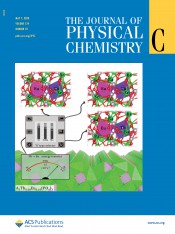abstract
In this study the optical spectroscopy, the excited state dynamics, and in particular the Tb3+ -> Eu3+ energy transfer, have been investigated in detail both from the theoretical and experimental point of view in eulytite double phosphate hosts A(3)Tb(PO4)(3) (A = Sr, Ba) doped with Eu3+. It has been found that the energy transfer is strongly assisted by fast migration in the donor Tb3+ subset. Moreover, the transfer rates and efficiencies depend significantly on the nature of the divalent elements present in the structure and hence on the distances between Tb3+-Eu3+ nearest neighbors. It is shown that the competition between quadrupole-quadrupole and exchange interaction is crucial in accounting for the transfer rates.
keywords
ORDER REGULAR APPROXIMATION; LANTHANIDE IONS; CHEMICAL-BOND; SPECTROSCOPIC PROPERTIES; INTENSITY PARAMETERS; TB3+-DOPED KPB2BR5; TRANSFER RATES; UP-CONVERSION; STATE ENERGY; LUMINESCENCE
subject category
Chemistry; Science & Technology - Other Topics; Materials Science
authors
Neto, ANC; Jr, RTM; Shyichuk, A; Paterlini, V; Piccinelli, F; Bettinelli, M; Malta, OL
our authors
Other
Cover
Mediaacknowledgements
The authors gratefully thank Erica Viviani (Univ. Verona) for expert technical assistance and the Facility Centro Piattaforme Tecnologiche of the University of Verona for access to the Fluorolog 3 (Horiba-Jobin Yvon) spectrofluorometer and Thermo ARL X'TRA powder diffractometer. Funding from the University of Verona is gratefully acknowledged. R.T.M., Jr., and O.L.M. would like to thank the Brazilian agencies CNPq, CAPES, FACEPE. A.N.C.N. thanks SusPhotoSolutions. Soluc comma o~es Fotovoltaicas Sustenta ' veis, CENTRO-01-0145FEDER-000005. This work was developed within the scope of the project CICECO-Aveiro Institute of Materials, UIDB/50011/2020 & UIDP/50011/2020, financed by national funds through the FCT/MEC and when appropriate cofinanced by FEDER under the PT2020 Partnership Agreement. VESTA visualization software,65 GIMP (https://www.gimp.org), and Inkscape (https://inkscape.org) were used in making some of the images.



